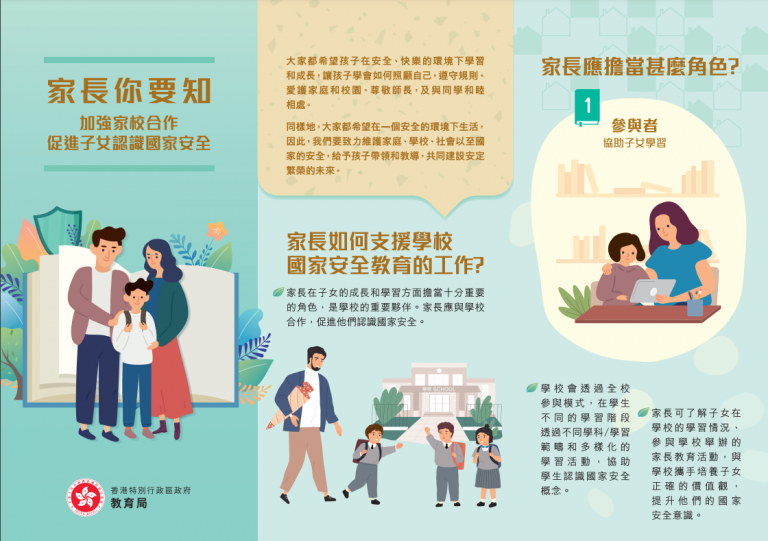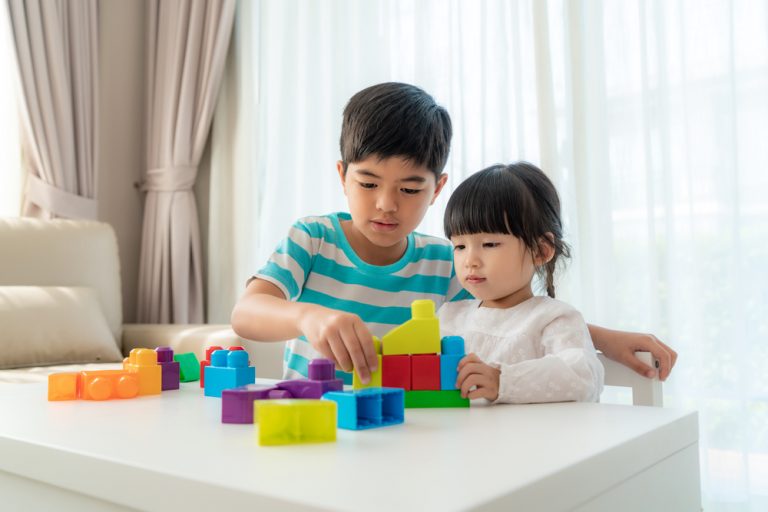
Helping your Children Understand National Security through Enhanced Home-School Co-operation
教育局就家長對《香港國安法》的認識,從而協助子女了解《香港國安法》的立法背景及訊息,其重要性及意義,建立正面的價值觀,故特意製作一份單張,讓家長了解自己在支援學校國家安全教育工作上應擔當的角色。

教育局就家長對《香港國安法》的認識,從而協助子女了解《香港國安法》的立法背景及訊息,其重要性及意義,建立正面的價值觀,故特意製作一份單張,讓家長了解自己在支援學校國家安全教育工作上應擔當的角色。

Written by : Marriage and Family Therapist Rachel Ng Children easily become timid, reticent, and lack confidence when dealing with hot-tempered parents. However, some children may learn to solve problems in an aggressive manner, mimicking their parents. Obviously, both patterns are detrimental to a child’s personality development! Can parents improve their hot-tempered nature? Personality tendencies and life stress It’s undeniable that a part of one’s temperament is innate, which we cannot overlook. Just like children have different traits, some parents are naturally more sensitive, react quickly, and have lower adaptability. These types of parents, when entering the stage of raising children, often coincide with a critical period in their career development. Due to their low adaptability, they easily become anxious due to changes in the environment, work demands, and their own career advancement, requiring a lot of time and energy to cope. At home, the various temperaments of children and their growing needs already pose many challenges to parents. Therefore, parents who are impatient and have low adaptability can easily lose their temper, using it as a way to vent their unease and attempt to control the situation, hoping to restore order and reduce their own anxiety. Trauma from the Family of Origin Some parents are not inherently impatient, but if they experienced neglect, abuse, and damage to their self-esteem and personality during their upbringing, these parents are likely to perceive their child’s disobedience, tantrums, and other challenging behaviors as personal rejections, triggering their own childhood traumas and leading to

Written by : Pario Children, Parenting Education Centre Childhood and family have a profound impact on a person. How do parents influence their children’s growth? How to cultivate good behavior and character in children? Is it correct and effective to use rewards and encouragement? Do not turn love for your child into a reward It is often heard that parents say, “If you behave, daddy will shower you with love.” Parents think this is providing positive reinforcement, encouraging positive behavior in children, but shouldn’t the companionship of mom and the affection of dad be unconditional? Love and affection should not be contingent on being well-behaved! A child’s self-worth should not be equated with their behavior or achievements. Do not turn existing habits into rewards Some parents might say: “If you behave, we will go to the park on Sunday!” When the child behaves in a “naughty” manner, parents cancel the child’s original plan to play in the park, letting the child learn to bear the consequences. Although this is one of the parenting methods, if the child originally has the habit of going to the park every day, and the parents use “going to the park” as a reward, is this really a reward? This is just continuing the daily routine! Of course, if the child does not usually have the opportunity to go to the park, this reward would be very attractive to a child who naturally loves to play! Clearly explain rewards and good behavior Rewards are necessary!

Shirley Loo:Playing and toys Child, in my memory, you rarely asked me to buy toys during your childhood. I wonder if this has anything to do with that time when I took you away from home to “Fun World.” Do you still remember standing in front of that plush toy? I made up many stories, saying that Ning Ning wanted to take them home, and they cried, saying “they didn’t want to leave their own home.” As a result, you believed it to be true and your heart softened, and you no longer pleaded with me to buy the plush toys. But it also let us know that plush toys were your favorite, so whenever we went on business trips, we would buy one to bring back for you as a souvenir. Do you still remember Dutchess, the cute brown pony? Aside from plush toys, my memories related to toys are quite vague. I only remember singing games around the dining table after meals, playing with paper balls when you were recovering from a fever, and building sandcastles with you on the beach and catching crabs by the rocks, none of which involved spending money on toys. I also remember setting a rule back then: no video games at home. You begged many times, asking why we couldn’t buy an X Paradise to play at home, and my response was: “Once a week at your cousin’s house is enough!” I wonder if this kind of “persistence” made you feel uncomfortable.

Written by : Registered Educational Psychologist, Pang Chi Wah Many parents lament that in the past, interactions with neighbors were more frequent. Perhaps there were fewer places to live, but there were larger communal spaces, allowing for daily interactions with neighbors. Parents used to entrust their children to neighbors, and could borrow necessities from them when in need, resulting in very happy relationships! However, in the modern living environment, there may be many people living in the same building, but the likelihood of interacting with each other is much less than before. People no longer share food or take care of each other’s children. Perhaps everyone is busy with work, spending all their energy during the day, and they have no time to develop deep relationships with neighbors after work or on holidays. Nowadays, many couples without children can live this way, but once small families have children, parents need to deliberately increase the frequency and form of interactions with neighbors. In fact, more and more families are finding that their children are becoming self-centered and disrespectful to others. It turns out that only children can become subjective and fragile because they rarely experience social pressures or conflicts during their growth, and they tend to avoid social interactions. Over time, their social desires and skills may not reach the standard expected for their age. Some parents may want their child to have a sibling and consider having another child, but they must also consider the financial and emotional impact on

Written by: American Association for Play Therapy, Registered Play Therapist-Supervisor, Registered Social Worker Chan Tsz Wai According to Maslow’s hierarchy of needs, a sense of security is the second basic human need, just after physiological needs. Children who lack a sense of security may exhibit many behavioral problems. Without sufficient support to confidently explore the world, and without enough confidence that someone can provide safe protection, they may send misleading signals through problematic behaviors to express their emotional needs. Often, parents think that managing behavior more strictly will solve these behavioral issues in children, but this approach can backfire, leading to even less fulfillment of the child’s emotional needs. Years of research have found that a sense of security is based on establishing a secure attachment relationship with caregivers. Children with secure attachment relationships have a higher ability to regulate their emotions, solve problems on their own, have higher self-esteem and empathy, and possess better social skills and the ability to establish good relationships with others. However, how to establish a secure attachment relationship with children is a challenge for many parents. Understanding the needs of children Sometimes children need to explore the world on their own and use their abilities to solve problems, while at other times they need the help of their parents to regulate their emotions. Parents need to know when to let go and when to extend their hands to offer hugs and support, which requires careful observation of the child’s needs. Young

Written by: Pang Chi Wah, Registered Educational Psychologist, New Horizons Development Centre Hong Kong is a society abundant in material wealth, but due to the overabundance of resources, when children have needs in life, parents quickly provide them with ample supply, allowing them continuous satisfaction. However, parents satisfying their children’s needs too quickly can have a negative impact on them, failing to cultivate their ability to endure, and over time, their patience may become limited. Utilizing Emotional Intelligence to Cultivate Children’s Patience Delaying gratification or the fulfillment of life’s needs is an important part of developing emotional intelligence (EQ). If parents are accustomed to quickly satisfying their children’s needs but then complain about their lack of patience, such criticism is unfair to the children, as their patience has simply not been nurtured. How can one delay the fulfillment of children’s needs? To train children’s emotional intelligence, the secret is “neither using the cane nor the carrot,” meaning that neither corporal punishment nor frequent rewards are necessary. Instead, patience and the ability to wait are cultivated through daily life experiences. Parents can try the following examples: Example 1: When parents and children go to a dim sum restaurant, there is no need to let the children eat whatever they like immediately. Parents can ask the children to wait for 5 minutes after finishing one basket of dim sum before eating a second type; or they can require the children to wait until the parents have eaten a portion before they can

Written by: Mr. Victor Ching, Registered Psychologist, Child Psychological Development Association I have been working in early childhood education for some time and has observed that many institutions and parents have distorted values, which ultimately harms the next generation. However, I also understand the pressure parents face, possibly due to excessive competition. My educational philosophy is to inspire children’s interest in learning. The child has attended various interest classes and participated in public competitions voluntarily. I never forced learning but instead exposed the child to different things from a “play” perspective to spark interest. Not everything introduced will capture the child’s interest, but that’s okay because there are many fun things in the world! For example, the child once tried playing the piano at a nearby piano store and fell in love with it, insisting on learning. However, I did not immediately enroll the child in lessons but allowed for more exposure to confirm the interest. Even after studying for over a year, the child has not taken any exams because I believe the interest should not be overshadowed by the pressure of exams and does not want the child to lose interest in music. Regarding a Mandarin recitation competition, when the child was in K1, the teacher selected students for the competition, but the child was not chosen. The mother told the child to express the desire to participate directly to the teacher. The same situation occurred in K2, and the family’s response was consistent. By K3, when the

Written by: Octopus Parent, Mr. Leung Wing Lok The registration for Primary One discretionary places has closed, and parents who have “bought and left” can only resign themselves to fate. During the period from now until the release of the allocation results, the only thing that can be done under the government’s school allocation system is to “wait idly.” There are still a small number of Direct Subsidy Scheme (DSS) and private schools accepting applications. Parents who are unwilling to participate in the lottery for the central allocation can try their luck with DSS and private schools. Moreover, there are many websites that list the application deadlines for self-financed and private schools. For parents of students who have already applied to DSS and private schools, especially those who are preparing intensively for interviews, I must remind parents to prioritize their children’s mental health. Intensive interviews harm children’s psychology Humans always tend to repeat mistakes. Every year, after the peak period of interviews in September and October has passed, there are many well-intentioned people and organizations concerned with children’s mental health reminding us not to let intensive interviews harm children’s psychology. From what I remember, the most shocking newspaper headline was “Unable to withstand the intensive interviews for Primary One, a 5-year-old girl becomes depressed and wants to jump off a building.” These young children, only 5 or 6 years old, still do not understand what primary school life is about, nor do they know the difference between good and bad

Written by: Registered Public Health Nutritionist (UK) and Nutritionist, Ng Pui Yu Many parents have encountered the issue of their children having difficulty with bowel movements. When this problem arises, parents usually increase the fiber content in their children’s diet, but the effectiveness varies from person to person. What should be noted in this process? What is an appropriate amount of fiber? Many people know that eating foods high in fiber such as whole grains, nuts, beans, fruits (like prunes, figs, kiwis, bananas, apples, pears, etc.) and vegetables (like eggplants, bell peppers, daylilies, amaranth, broccoli, cabbage, mustard greens, spinach, Chinese broccoli, snow fungus, mushrooms, etc.) can stimulate intestinal peristalsis. It turns out that when fiber absorbs water, it becomes soft and expands like a sponge, stimulating the urge to defecate. Sufficient fiber also helps promote the growth of beneficial bacteria in the intestines, which can improve constipation. It is important to note that when increasing dietary fiber, it should be done gradually, increasing slowly every few days, otherwise, if the body cannot adapt, it may make the stool even harder. The daily dietary fiber requirement for children is their age plus 5 grams. For example, a 4-year-old child should have a daily dietary fiber intake of about 4+5=9 grams. To consume enough fiber, children aged 2 to 5 years old need at least 1.5 servings of vegetables (1 serving = 1/2 bowl of cooked vegetables) and at least 1 serving of fruit (1 serving = 1 medium-sized fruit, such as